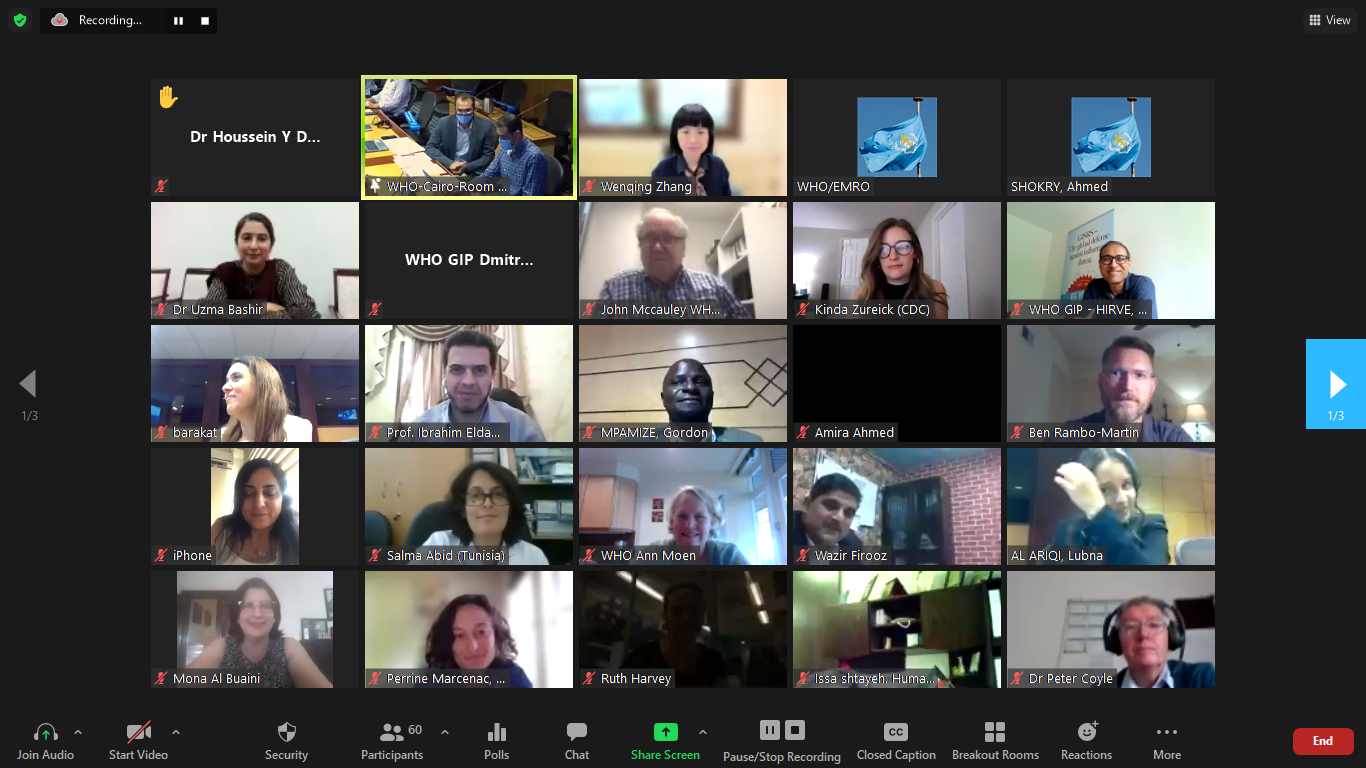 Cairo, 2 August 2021 – WHO convened a meeting for the directors of national influenza centres (NICs) in the Eastern Mediterranean Region to share new laboratory techniques and methodologies for influenza virus detection and characterization and discuss challenges they face in these areas of work. The meeting took place on 15 July 2021 and was organized by the Infectious Hazard Prevention and Preparedness unit of the WHO Health Emergencies Programme at the WHO Regional Office for the Eastern Mediterranean.
Cairo, 2 August 2021 – WHO convened a meeting for the directors of national influenza centres (NICs) in the Eastern Mediterranean Region to share new laboratory techniques and methodologies for influenza virus detection and characterization and discuss challenges they face in these areas of work. The meeting took place on 15 July 2021 and was organized by the Infectious Hazard Prevention and Preparedness unit of the WHO Health Emergencies Programme at the WHO Regional Office for the Eastern Mediterranean.
Directors of laboratories in the 22 countries of the Region were invited, along with staff from WHO focal points at the regional, country and global levels. Representatives from WHO Collaborating Centres for Reference and Research on Influenza attended the meeting, including the US Centers for Disease Control and Prevention, the Francis Crick Institute and the University of Melbourne.
Country representatives identified current challenges facing NICs and other influenza laboratories in maintaining routine influenza surveillance during the COVID-19 pandemic with laboratories prioritizing testing for SARS-CoV-2 while also facing shortages in laboratory supplies and high turnover of staff, and sentinel sites being overwhelmed with COVID-19 cases. At the same time, the key opportunity acknowledged by all countries was the leveraging of influenza surveillance systems for COVID-19 response.
During the meeting, an update on the February 2021 WHO vaccine composition meeting was presented followed by an introduction to the GISRS+ platform, which builds on the success of existing infrastructure with the addition of other respiratory viruses with epidemic and pandemic potential. The situation of integrating surveillance of influenza with SARS-CoV-2 was summarized, and it highlighted the importance of handling priority public health needs simultaneously, as well as using the integrated surveillance of influenza and other respiratory viruses in GISRS to promote representativeness, timeliness and continuity. The development of protocols on whole genome sequencing of influenza and SARS-CoV-2 was also introduced to the participants, along with the development of a multiplex RT-PCR assay to test for influenza A, influenza B, and SARS-CoV-2 at the same time.
The meeting concluded by identifying and sharing recommendations and a way forward emphasizing the role of NICs and other influenza laboratories in implementing and continuing to work on both influenza and SARS-CoV-2 testing. Countries were advised to consider using multiplex kits and to report in a timely and consistent manner to FluNet or EMFLU.
WHO has granted NIC status to laboratories in 17 countries of the Eastern Mediterranean Region, namely Afghanistan, Bahrain, Egypt, Iraq, Islamic Republic of Iran, Jordan, Kuwait, Lebanon, Morocco, Oman, occupied Palestinian territory, Pakistan, Qatar, Syrian Arabic Republic, Sudan, Tunisia and United Arab Emirates. Four more countries in the Region have national influenza laboratories, namely Libya, Saudi Arabia, Somalia and Yemen, and it was strongly agreed that WHO will provide technical support to all laboratories to enhance their capacities.
Related links
Regional directors of national influenza laboratories to enhance collaboration




